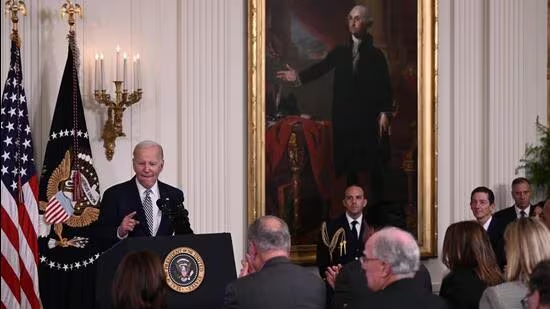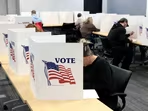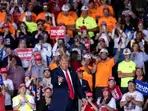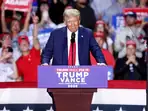Biden unveils major AI regulation policy
Washington: US President Joe Biden, in the most ambitious set of actions taken by any government in the world on artificial intelligence (AI), has invoked the Defense Production Act to instruct all companies developing AI models with implications for national security, health, and economic security to notify the federal government and share results of red team safety tests to ensure it is safe and secure.

Biden has also taken a range of other actions in an executive order, including a major immigration reform push to attract and retain AI talent in America, a move that will have implications for Indian scientists, designers, engineers, coders and others with domain knowledge.
We're now on WhatsApp. Click to join.The executive order, signed on Monday, instructs relevant agencies, with a specified timeframe, to develop standards, tools and tests to ensure AI models are safe and secure. It also calls for work to be done on new standards for biological synthesis screening to protect against the risk of the use of AI to engineer dangerous biological material; develop guidance for content authentication and clear watermarking to label AI-generated content; establish an advanced cybersecurity programme to make software and networks more secure; and develop a national security memorandum to ensure that the US military and intelligence community uses AI “safely, ethically and effectively”.
The orders will likely have a global implication on the AI industry since all companies with the most advanced models --- OpenAI, Google and IBM --- are headquartered under American jurisdiction.
A White House factsheet also pointed out that the US has been in touch with its partners and allies on the issue, including India, and the executive order will complement Japan’s leadership of the G-7 Hiroshima Process, the UK Summit on AI Safety, India’s leadership as chair of the Global Partnership on AI, and ongoing discussions at the United Nations.
“We going to see more technological change in the next 10, maybe the next 5 years, than we have seen in the last 50 years…(AI) is the most consequential technology of our time…Much of it is making our lives better…In some cases, AI is making life worse,” said Biden to an audience of America’s political and tech elite.
He added that this technology must be governed and even as the administration awaits US Congressional action, and said the order built on earlier administration efforts of drawing up an AI bill of rights and ensuring voluntary commitments by leading AI companies.
Definition and principles
The executive order provides a specific definition of AI as a “machine-based system that can, for a given set of human-defined objectives, make predictions, recommendations, or decisions influencing real or virtual environments”. An AI model is a “component of an information system that implements AI technology and uses computational, statistical, or machine-learning techniques to produce outputs from a given set of inputs”.
It also lays out eight broad principles that have guided the administration’s approach to AI: a safe and secure AI; promotion of responsible innovation, competition and collaboration to allow US to lead the sector; supporting workers while developing AI; advancing equity and civil rights; protection of privacy and consumer rights; managing the risks of the federal government’s use of AI; and global engagement to build and promote safeguards.
Promoting innovation; the immigration push
To attract and retain talent to ensure America’s competitive edge remains in AI, the order also asks both the Secretary of State and Secretary of Homeland Security to, within 90 days, “streamline processing times of visa petitions and applications…facilitate continued availability of visa appointments” for applicants with expertise in the domain.
It asks the State department to, within 120 days, initiate new rulemaking to establish new criteria to designate countries and skills as it relates to a two-year foreign residency requirement for J-1 non-immigrants (who have to return home after completing their stint in US; it appears that the new rules will tweak this to enable their stay in the US). It also instructs the State Department to implement a domestic visa renewal regime to facilitate those with expertise in AI and critical and emerging tech to stay on in the US without interruption. Within 180 days, the State Department is also expected to expand those eligible for domestic visa renewal to include scholars on J-1 and F-1 visas and establish a programme to attract top talent in the domain.
The order instructs the homeland security secretary to “clarify and modernise” immigration pathways for experts under a range of visa categories (O-1A, EB-1, EB-2, all for non-citizens of exceptional ability) and asks the Labour secretary to seek public inputs to identify STEM occupations with inadequate workforce.
All of this is meant to boost American innovation, for which the order has launched a National AI Research Resource to “pursue the infrastructure, governance mechanisms, and user interfaces to pilot an initial integration of distributed computational, data, model, and training resources to be made available to the research community in support of AI-related research and development”.
It sets a target of launching one regional innovation engine to prioritise AI research within 150 days, and four such engines within 540 days. The order also lays out instructions to relevant agencies to clarify and ease patent processes, establish training programmes, address copyright issues, prioritise AI use in health, climate and clean energy.
Privacy, equity, consumer rights
But the thrust of the order lies in installing safeguards. The White House factsheet said that even as Biden called on the Congress to pass a bipartisan data privacy legislation, the order itself prioritises federal support for privacy-preserving techniques.
The order also provides guidelines to landlords, federal benefits programmes and federal contractors to stop “AI algorithms from being used to exacerbate discrimination”, including in domains such as sentencing, parole and prosecution.
America sees itself as leading the global push on AI, at a time when UK is hosting a summit on AI, which will be attended by vice president Kamala Harris this week in London.
The order directs an expansion of engagement at the bilateral and multilateral levels to accelerate the development and implementation of global AI standards and promote its safe and responsible use.
Disclaimer: The copyright of this article belongs to the original author. Reposting this article is solely for the purpose of information dissemination and does not constitute any investment advice. If there is any infringement, please contact us immediately. We will make corrections or deletions as necessary. Thank you.
Title:Biden unveils major AI regulation policy
Url:https://www.investsfocus.com









